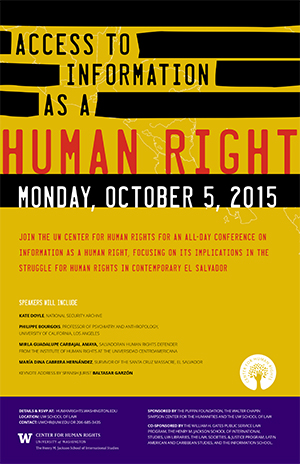Tens of thousands of civilians disappeared during El Salvador’s bloody armed conflict from 1980 to 1992. More than three decades later, loved ones and human rights groups still seek information about what happened and who should be held accountable. Some answers can be found in U.S. government documents, but gaining access to those documents can be a challenge.
On October 5, the UW Center for Human Rights (UWCHR) will host a one-day conference, “Freedom of Information as a Human Right,” to address how access to information can be a tool in securing truth, justice, and reparations for victims of crimes against humanity. Renowned Spanish jurist Baltasar Garzón will serve as keynote speaker.

Access is a pressing issue for UWCHR, an interdisciplinary center housed in the Jackson School of International Studies. Working with other organizations to seek truth and accountability in post-war El Salvador, UWCHR has filed more than 200 requests for documents from the U.S. government through the Freedom of Information Act (FOIA), with mixed results.
“When we started working with human rights groups in El Salvador, I didn’t know that FOIA was going to turn into such a big area of our work,” says UWCHR director Angelina Godoy, the Helen H. Jackson Endowed Chair in Human Rights and professor of international studies and law, societies, and justice. “But there is a huge need for research, so that has been our role. We have explored every possible avenue to get information, including seeking information from the files of the U.S. government."
Government documents rarely contain specific information about Salvadorans who died during the conflict, many of whom were rural peasants. Yet the documents still have value. “We can do research on the circumstances around a person’s disappearance—the military operation in which they died—even if the individual’s name might not have been recorded,” says Godoy. “That information can be very useful for holding individuals and governments accountable for abuses.”
The bureaucratic paperwork involved in FOIA requests can be daunting. Government agencies’ guidelines for submitting a request vary, as do their responses. Some agencies are forthcoming; others are not. “We spend an immense amount of time on the FOIA process, on filing requests and following up on them and doing the research that feeds into them,” says Godoy. “And despite legislation that says that access should be the rule rather than the exception, some government agencies have that inverted in actual practice and the exception is that you get information.”
I think it’s fundamental that we listen to the voice of the people who went through these experiences, sharing why justice matters all these years later and why that’s still a pending debt.
Conference speaker Kate Doyle knows that all too well. Doyle is a senior researcher at the National Security Archive, a nonprofit dedicated to government transparency in foreign policy. A leading expert in accessing government documents and using them in human rights litigation, she has been a “singular force in a number of cases that have changed history,” says Godoy.
Also speaking at the conference will be Philippe Bourgois and Dina Cabrera, survivors of the 1981 Massacre of Santa Cruz in El Salvador, a particularly gruesome invasion in which armed forces directly targeted the unarmed civilian population. Bourgois, an American anthropologist now on the faculty at UCLA, was doing PhD research in El Salvador when the massacre left him fleeing for his life alongside thousands of Salvadorans. Cabrera was living in rural El Salvador, where she and other survivors continue to reside.
“The strength of Cabrera’s contribution to the conference is her first-person account of why justice matters to her as a survivor,” says Godoy. “I think it’s fundamental that we listen to the voice of the people who went through these experiences, sharing why justice matters all these years later and why that’s still a pending debt. Unfortunately the same people who were victims of massacres are still marginalized today, so we don’t usually hear their voices.”
Salvadoran attorney Mirla Carbajal will speak at the conference as well, discussing how the struggle for access to information in U.S. courts relates to her work in El Salvador. Carbajal represents Cabrera and other survivors of the Massacre of Santa Cruz, through the Human Rights Institute of the Universidad Centroamericana “José Simeón Cañas.”
Godoy hopes that shedding light on the importance of access to information, and putting a human face on the issue, will have an impact. Because while FOIA is important to the struggle for justice and human rights, the law is only effective if agencies comply.
“Just like any other law that grants us rights, what’s important is that people take up that law and struggle to make sure those promises are carried out,” says Godoy. “Ensuring access to information requires constant vigilance and advocacy.”
. . .
Along with the UW Center for Human Rights, other major sponsors of the Access to Information as a Human Right conference include the Puffin Foundation, the UW’s Walter Chapin Simpson Center for the Humanities, and the UW School of Law.
More Stories

AI in the Classroom? For Faculty, It's Complicated
Three College of Arts & Sciences professors discuss the impact of AI on their teaching and on student learning. The consensus? It’s complicated.

A Sports Obsession Inspires a Career
Thuc Nhi Nguyen got her start the UW Daily. Now she's a sports reporter for Los Angeles Times, writing about the Lakers and the Olympics.

A Healing Heart Returns
In February, the UW Symphony will perform a symphony that Coast Salish elder Vi Hilbert commissioned years ago to heal the world after the heartbreak of 9/11. The symphony was first performed by the Seattle Symphony in 2006.